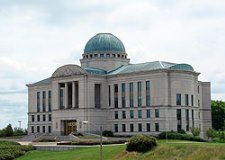Iowa Supreme Court Contemplating Diploma Privilege
 The Iowa Supreme Court has recently announced that it is entertaining a proposal that would exempt graduates of the University of Iowa and Drake University law schools from the Hawkeye state’s bar examination. If the rule is adopted, Iowa would join Wisconsin as the only state that grants the diploma privilege to graduates of American Bar Association accredited law schools within its boundaries.
The Iowa Supreme Court has recently announced that it is entertaining a proposal that would exempt graduates of the University of Iowa and Drake University law schools from the Hawkeye state’s bar examination. If the rule is adopted, Iowa would join Wisconsin as the only state that grants the diploma privilege to graduates of American Bar Association accredited law schools within its boundaries.
The diploma privilege refers to the practice of admitting the graduates of certain law schools to a state bar without requiring them to take a bar examination. Although the number of states recognizing some version of the diploma privilege at some point in their history is approximately 30, the use of this mechanism was denounced by the American Bar Association in the 1910s and 1920s and fell into disfavor in the second half of the 20th century.
However, as late as 1980, there were still five states that recognized the diploma privilege: Mississippi, Montana, South Dakota, Wisconsin, and West Virginia.
Except for Wisconsin, each of the states that retained the privilege were small, predominately rural states with a single ABA-accredited law school that was also operated by the state. (Mississippi had a second, private, law school but at that time, the Mississippi College of Law was not ABA-accredited and thus did not qualify for the Mississippi diploma privilege.) Of the five states, only Wisconsin had two ABA-accredited law schools.
For a variety of reasons, the other four states abolished the diploma privilege during the 1980s. After the elimination of the West Virginia diploma privilege in 1988, Wisconsin remained as the only state to offer this route to bar admission for all graduates of the state’s ABA-accredited law schools.
However, in 2005, the Supreme Court of New Hampshire recognized a “partial” diploma privilege for graduates of a new Daniel Webster Scholars program at the Franklin Pierce Law Center, the state’s only ABA-accredited law school. Under the new program, 20 second-year Franklin Pierce law students were selected for an intensive two-year program that focused upon skills training and the law of New Hampshire and which substituted for the second and third years of law school.
Upon completion of the two-year Daniel Webster program, these students were admitted to the New Hampshire bar without further examination, so long as they met character and fitness requirements and passed the Multi-state Professional Responsibility Examination (MPRE).
In 2010, the Franklin Pierce Law Center became the University of New Hampshire Law School, and more recently the number of entering students was increased to 24. However, even with the slight increase in numbers, only a minority of the law school’s students can avail themselves of this option.
In 2013-2014, UNH admitted a first-year law class of 77. Barring a further increase in size of the Daniel Webster Scholars program, less than a third of these will have the option of pursuing the “partial” diploma privilege route.
Under the Iowa proposal mentioned above, Drake and University of Iowa graduates would still have to take a class on “Iowa law and procedure” while in law school, pass the Multi-state Professional Responsibility Examination, and satisfy a character and fitness evaluation, but they would otherwise be exempted from the Iowa bar examination. As a result, if the proposal is accepted by the Supreme Court, graduates of the two law schools could, as is the case in Wisconsin, begin the practice of law immediately after graduation (at least if they had already taken and passed the MPRE examination, which can be taken while a law student).
The Iowa State Bar Association has already endorsed the diploma privilege proposal, and the state Supreme Court is expected to rule some time during the summer of 2014. There seems to be little doubt that this move is prompted by concerns regarding the economic plight of recent law school graduates from the state’s two law schools. The diploma privilege would free them from having to pay the costs of a bar review course and would allow them to begin work as lawyers several months earlier than is currently the case.
In recent years, Iowa has had one of the highest bar examination pass rates in the United States. In 2012, for example, its overall passage rate of 88% was the third highest in the United States, trailing only Missouri (89%) and Montana (91%). Its July examination passage rate — which is when most law school graduates take the examination — of 90% was exceeded only by Missouri’s 91%. Moreover, according to the state bar association, over the past five years 62% of those who did fail the Iowa examination passed it on their second try.
It will be interesting to see if the Iowa Supreme Court accepts this recommendation. If it does, it will then be interesting to see if other states — especially those with high passage rates — also move to embrace (or re-embrace) the diploma privilege.

